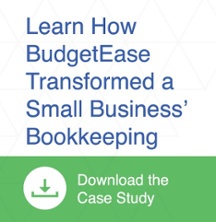 Small business owners wear many hats, and it's easy to let things slip through cracks (like that great marketing campaign you were going to do for the holidays). It's nothing to feel bad about ... when priorities shift, your attention and time needs to as well. There are plenty of tasks that can be tabled, but there are some that border on dangerous when delayed, and bookkeeping is one of them. When you let it pile up and get too far behind, the details start to slip and are harder to reconstruct. So, we thought we'd share a few of our sagely tips that seem to be useful in keeping the time spent tracking your finances as efficient and effective as possible.
Small business owners wear many hats, and it's easy to let things slip through cracks (like that great marketing campaign you were going to do for the holidays). It's nothing to feel bad about ... when priorities shift, your attention and time needs to as well. There are plenty of tasks that can be tabled, but there are some that border on dangerous when delayed, and bookkeeping is one of them. When you let it pile up and get too far behind, the details start to slip and are harder to reconstruct. So, we thought we'd share a few of our sagely tips that seem to be useful in keeping the time spent tracking your finances as efficient and effective as possible.
1. Make an Appointment with Your Books
We mean this as literally as we possibly can. Block a time in your calendar once a week. Instead of doing it as you find the time, which can be uncertain, pick the same time slot each week. Developing that routine helps keep your process regular, prevents pile up, and will save you time. It also should be known among your staff that this time is sacrosanct. Every once in awhile you're bound to slip, but like going to the gym, the more regular you are, the higher your chance of success. When you miss a week, there is not much to catch up. If you are on a monthly schedule and miss a month, catch-up is much harder.
2. Don't Make Business Personal
Obviously business can be quite personal -- it's your livelihood and you may have sacrificed quite a lot to get where you are. But, your financial accounts, personal and business, should be kept separately. If you're self-employed, this might seem like an unnecessary step. But, be forward thinking. Your hope is to grow and at some point you'll need to hire someone to do the bookkeeping you're doing now. Accurately tracking what you're paying yourself can be critical in developing your pay structure for that new hire. Also, if you decide to sell your business, those numbers need to be separate. You may be smallish now, but think like you'll be huge someday!
3. Use a Reliable Financial Software
We're not keeping ledgers in black and red pen anymore, we can do better than that. There are great programs available as both downloaded software and software-as-a-service (SAAS) -- subscription-based software that's centrally hosted. These not only help digitize your bookkeeping, they link your accounts so information is joined automatically and they provide incredible reporting at the touch of a button. You'll be able to identify trends that you would miss manually, and really gain an unlimited way to look at your financials. We are huge fans of QuickBooks. There are a lot of benefits to this program, but for now you can check out our article on how QuickBooks can simplify your bookkeeping.
4. Don't Be in Denial -- Reconcile!
It's hard and it's boring, but you can't ignore it. Reconciliation is probably the most important part of bookkeeping while simultaneously being the most neglected. You have to tell the story of your money, and this is how you do it. It's done with bank accounts, credit cards, payroll, loans, and lines of credit. We weave a tangled web when it comes to spending money, this is the part where you find the beginning and trace it to the end and confirm each transaction is valid. It's critical.
5. Know What's Important ... to You
There are a lot of reports that are standard and completely necessary. Ones that any outside business person could look at and understand your spending, revenue, and ultimately your value -- the classic P&L for example. But, there may be factors that are more valuable to your assessment of success or failure. Make sure you have the information you need to give you the reports that add value to you. You do this by entering sales by client and always attaching an expense to a vendor. Some of our favorite reports are: Profit by Client (need to be doing job costing), Profit & Loss Actual compared to Budget, Profit & Loss by Class, Profit & Loss by Product, and Sales by Client by Month to see trends in the work you are doing for each client. We also follow the Gross Margin each month with the Profit & Loss by Month report. What are you following?
When in Doubt, We'll Help You Out
We are bookkeeping -- and QuickBooks -- experts. Whether you need training, assistance, or an actual bookkeeper to do all of this for you, we can help.






